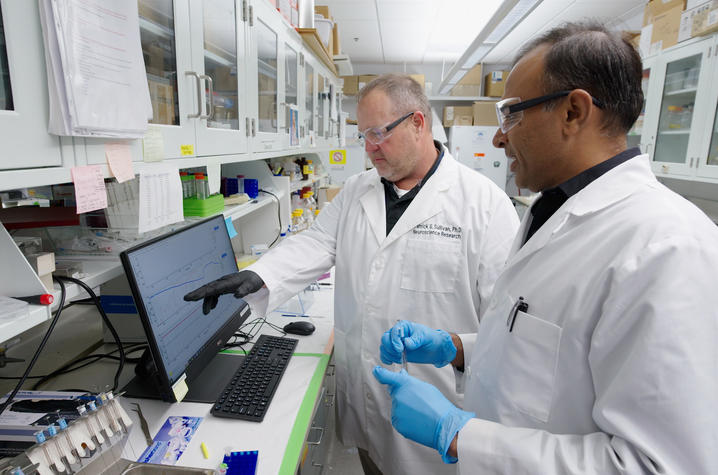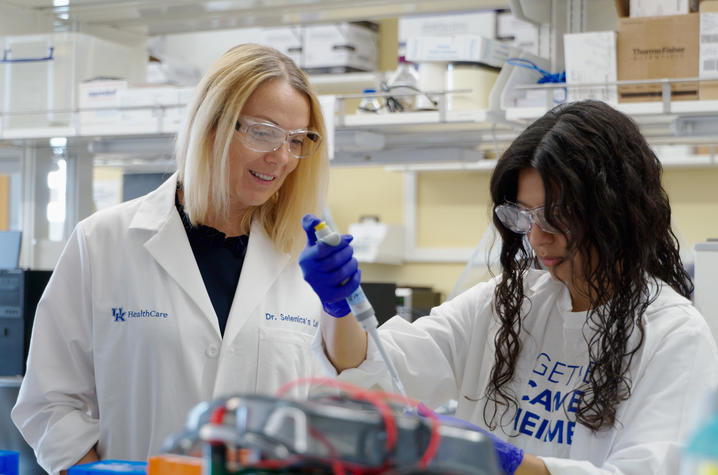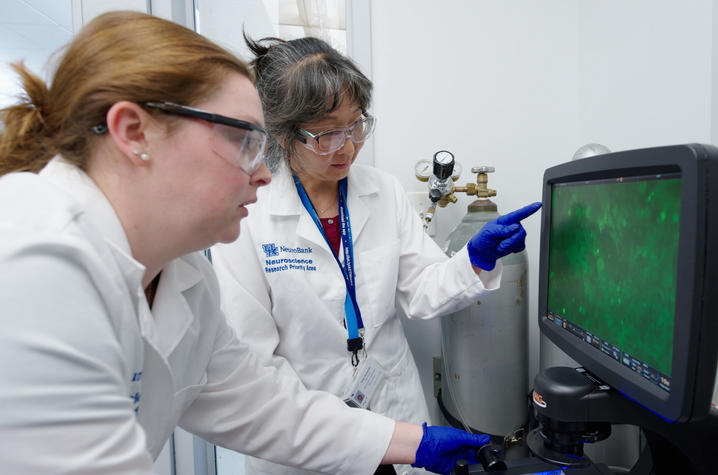NIH awards $10.6 million for central nervous system metabolism research center at UK
Video produced by UK Research Communications. To view captions for this video, push play and click on the CC icon in the bottom right-hand corner of the screen. If using a mobile device, click on the "thought bubble" in the same area.
LEXINGTON, Ky. (Sept. 5, 2023) — The University of Kentucky has been awarded a prestigious Centers of Biomedical Research Excellence (COBRE) grant to study central nervous system metabolism from the National Institute of General Medical Sciences (NIGMS), part of the National Institutes of Health (NIH). The $10.6 million, five-year grant will fund UK’s Center of Research in Central Nervous System Metabolism (CNS-Met).
Disruptions of CNS metabolism are linked in many neurological diseases, including Alzheimer’s disease, Parkinson’s disease, epilepsy, ischemia and traumatic CNS injury, but the mechanisms and underlying connections between CNS metabolism and disease are not well-defined.
The goal of the new multidisciplinary CNS-Met COBRE is to create a strategically designed framework that promotes leading-edge research on the role of metabolic mediators of brain function and disease.
“The CNS-Met COBRE will create a critical group of scientists who are skilled and well-equipped to foster a sustainable research center focused on CNS metabolism, with an emphasis on early-career research project leaders, continuing our legacy of these high-impact NIH-funded programs at UK,” said Lisa Cassis, vice president for research.
“The brain is interesting. At rest, it makes up about 2% of your body, but it’s consuming 20% of the oxygen you breathe in,” explained Patrick Sullivan, Ph.D., Spinal Cord and Brain Injury Research Center (SCoBIRC) Endowed Chair, neuroscience professor and grant principal investigator. “Metabolism is essential to everything that the brain does.”
The overarching goal of the CNS-Met Metabolomics Core is to make cutting-edge techniques and analyses available for researchers to study metabolomics and mitochondrial energy systems. Director Lance Johnson and Co-Director Samir Patel, both associate professors in physiology in the College of Medicine, lead the CNS-Met Metabolomics Core. The core will assist in experimental design, run samples, train personnel and analyze brain metabolism data.
Three early-career researchers were selected for funding through the center — Tritia Yamasaki, W. Brad Hubbard and Maj-Linda Selenica.
- Tritia Yamasaki, Ph.D., assistant professor in neurology in the College of Medicine, is researching metabolomics and Parkinson’s disease — what she says is an underexplored area. “We’re going to be looking at biomarkers for conversion to cognitive impairment in Parkinson’s disease,” Yamasaki said.
- W. Brad Hubbard, Ph.D., assistant professor in SCoBIRC and physiology in the College of Medicine and research physiologist at VA Lexington Health Care, is focusing on mitochondria — the powerhouse of the cell — and taking a mitochondrial-centric view of metabolism. “We are using a drug to target metabolism that we hope can restore mitochondrial function and metabolism in both neurons and blood vessels. We want to try to see how that can improve behavioral outcomes after a traumatic brain injury.”
- Maj-Linda Selenica’s lab is focused on molecular pathways and therapeutic approaches for Alzheimer’s disease and Limbic-predominant age-related TDP-43 encephalopathy (LATE). “We discovered that a protein called Eif5a impacts the accumulation of TDP-43 in the brain, and affects mitochondria function,” said Selenica, Ph.D., assistant professor in molecular and cellular biochemistry in the College of Medicine. “We hope to open a completely new venue of investigation and develop therapeutic strategies that target aberrantly hypusinated Eif5a in dementia and maintain a healthy brain metabolism.”
Research reported in this publication was supported by the National Institute of General Medical Sciences of the National Institutes of Health under Award Number P20GM148326. The content is solely the responsibility of the authors and does not necessarily represent the official views of the National Institutes of Health.




As the state’s flagship, land-grant institution, the University of Kentucky exists to advance the Commonwealth. We do that by preparing the next generation of leaders — placing students at the heart of everything we do — and transforming the lives of Kentuckians through education, research and creative work, service and health care. We pride ourselves on being a catalyst for breakthroughs and a force for healing, a place where ingenuity unfolds. It's all made possible by our people — visionaries, disruptors and pioneers — who make up 200 academic programs, a $476.5 million research and development enterprise and a world-class medical center, all on one campus.




